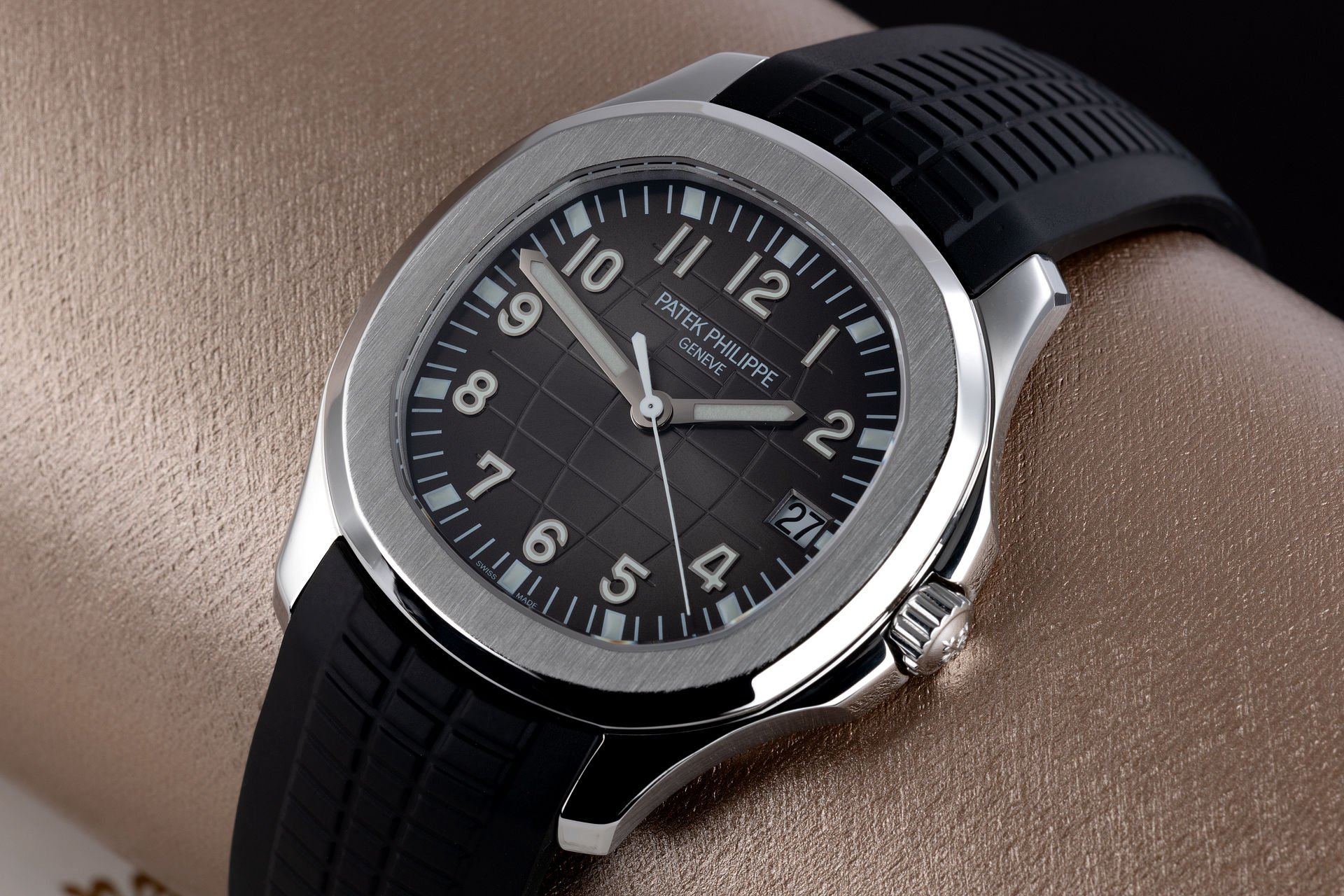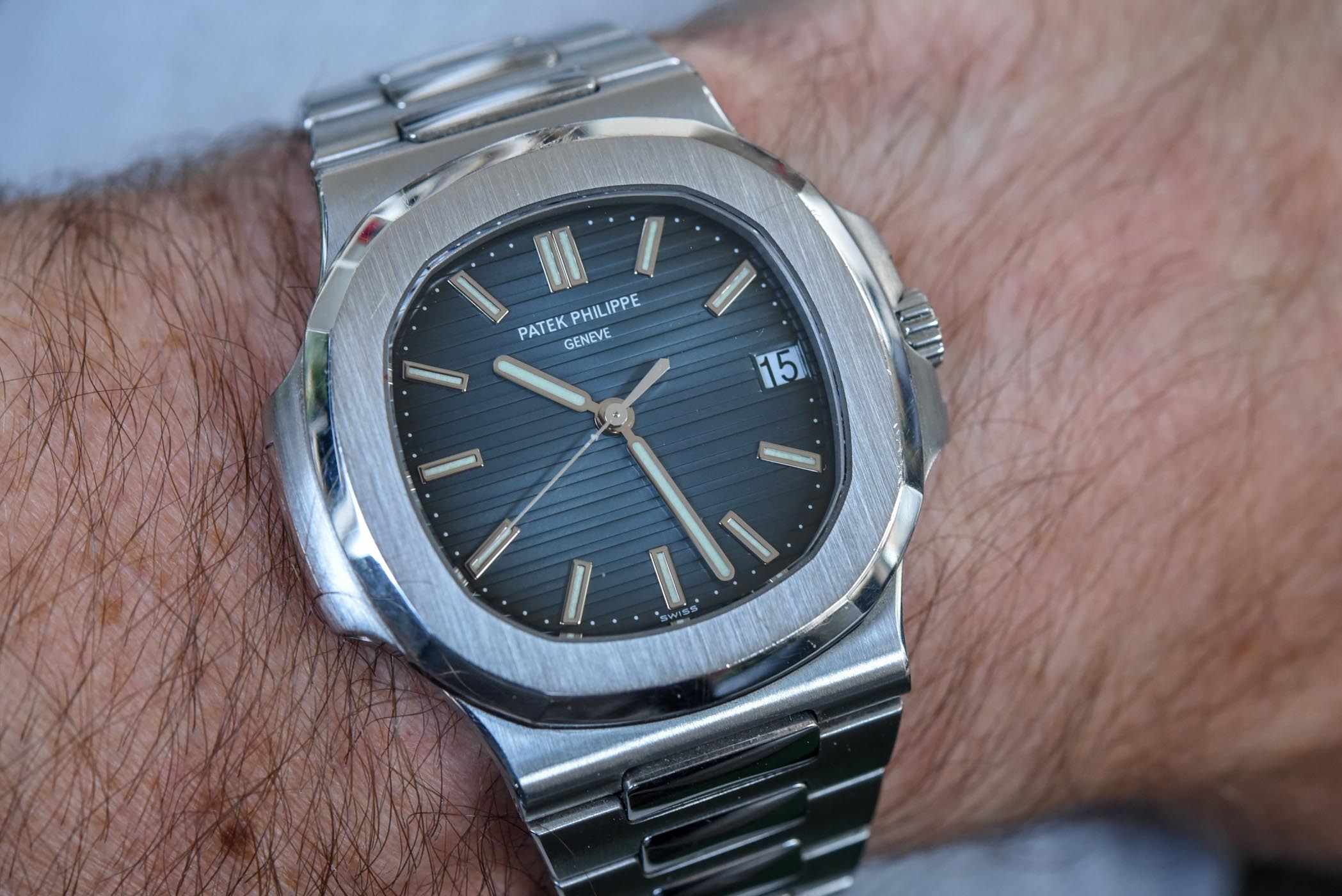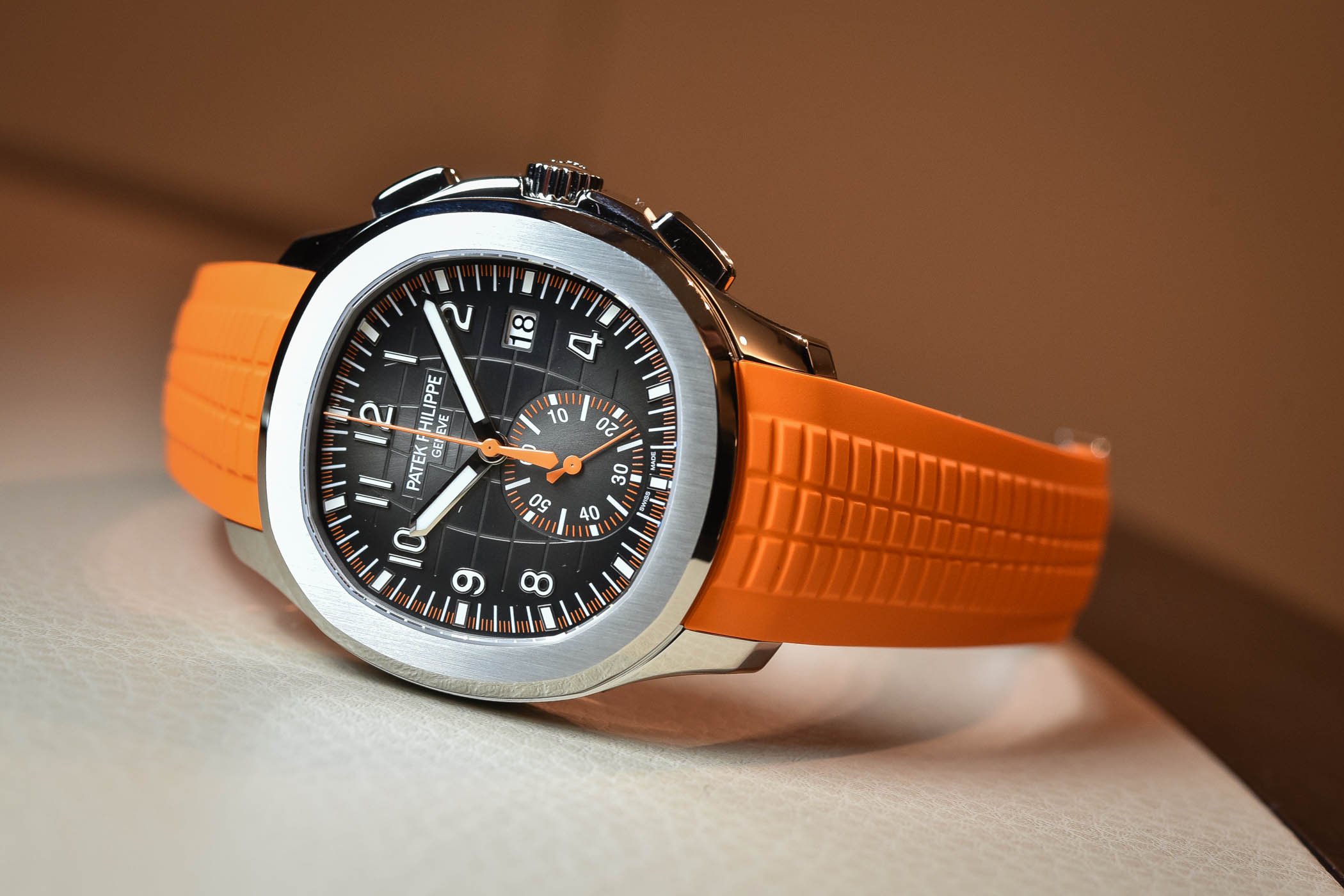The History of the Patek Philippe Aquanaut – Part 2
A 2-part series that tells you all about Patek Philippe's sports watch

Yesterday, we brought you Part 1 of our History of the Patek Philippe Aquanaut. That article paints a picture of the environment in which the Aquanaut was conceived and launched. The heady days of the dot.com boom in the mid-1990s, marked by a decidedly more casual approach to luxury. With its finger to the pulse, Patek Philippe responded to these changing tastes with the introduction of the first Aquanaut, the Ref. 5060A, in 1997. And a star was born. Now, we fast-forward a decade to 2007, where the 10th anniversary of the Aquanaut is marked by a complete update of the collection, setting the direction for all future models.
The 10th Anniversary
A year earlier, in 2006, Patek Philippe had celebrated another major milestone: the 30th anniversary of the Nautilus. This is when all the modern classics – the 5711, the 5712, etc. – were born. Riding the wave of this creative energy, Patek’s designers and engineers then turned their attention to updating the lines of the Aquanaut, in time for the 10th anniversary in 2007. This was no major overhaul, of course. The Aquanaut was already a very successful collection for Patek Philippe and there was no need to mess with the formula too much. Rather it was more of a refinement. Subtle changes here and there to make an already good watch even better.

As you might expect, the octagonal case, heavily influenced by that of the Genta-designed Nautilus, which itself was inspired by a marine porthole, was largely unchanged. Already considered iconic, there wasn’t really much to be improved upon. Thankfully Patek Philippe had the good sense not to do more than barely soften some of the edges, giving it an ever so slightly rounder appearance. Although, as we will see in a minute, an additional “extra-large” case size was introduced.
Where time and attention were well spent though was on the embossed pattern on the dial. As you would have seen in Part. 1, the geometric pattern on the first generation of Aquanauts was quite pronounced. In fact, the dials look very much like a block of Swiss chocolate. In the go-go 1990s, this sort of bold design was very much in vogue. A decade later, tastes had become a bit more refined, with a preference towards the understated. Accordingly, Patek smoothed out the dial of the Aquanaut somewhat. It uses the same basic pattern, but the embossing is less pronounced and slightly more curved.

The result is a dial that is less distinctive on the wrist but arguably also more versatile. This is the same dial design used on the Aquanaut today and I think it’s fair to say Patek made the right choice with this change. The other thing you will notice is that the Arabic numerals used to denote the hours are a touch larger and the number ‘3’ has been removed altogether. This allowed the date window to be moved towards the centre of the dial ever so slightly, meaning a lume plot could be added in the chapter ring at 3 o’clock. It’s a subtle change perhaps, but one which makes the flow of the dial even better than before.
The most significant changes pertain to the Tropical rubber strap. Patek redesigned the contours of the strap to match precisely with the curvature of the case. This represented the final evolution of the idea introduced on the very first Aquanaut, where the texture on the strap mirrored the pattern on the dial to create a sense of continuity. This is probably as close you can get to an integrated strap using rubber. The structure was also refined, with flat sides emphasizing the watch’s sportier nature and improved taper for a more contoured fit on the wrist. Even the inside of the strap was redesigned for added comfort. To hold it in place, Patek developed a new double-security fold-over clasp exclusively for the Aquanaut collection.
These changes were presented in two new models, one of which would become decidedly more popular than the other. Several more models would follow over the years, of course. So, let’s take a look at what they are.
Aquanaut Ref. 5167 & Ref. 5165
To celebrate the 10th anniversary of the Aquanaut and update the collection, Patek Philippe introduced two new models; the Ref. 5167 A-001 and the Ref. 5165 A-001. The latter was offered in a 38.8mm case and was effectively a direct replacement for its predecessor, the Ref. 5065A. Its (slightly) larger sibling though was the one that really caused a stir, which is probably why the Ref. 5165 is no longer in the collection.
At a modern 40.8mm (10 – 4 o’clock), the “extra-large” Patek Philippe Aquanaut Ref. 5167A was more closely aligned to the Nautilus in terms of wrist presence. It was still extremely comfortable on the wrist though, and arguably a better interpretation of the luxury sports watch aesthetic. At a mere 8.1mm thick, even with sapphire caseback and 120m water-resistance rating, this was a watch you could wear to the office with a suit and tie, and then leave it on when you headed out to dinner or to go clubbing. In many ways, it was the modern interpretation of the Aquanaut collection needed to stay relevant with changing tastes.
Inside both models was the same Calibre 315 S C found in the Ref. 5065. The following year, this was updated to the Calibre 324 SC with the introduction of the Ref. 5167/1A with integrated steel bracelet. This is the exact same movement found inside the Patek Nautilus Ref. 5711/1A. Self-winding, it incorporates several of Patek Philippe’s innovations. These include the four-spoke Gyromax® balance wheel and its slotted poising weights and the Spiromax® balance- spring in Silinvar® that maintains the oscillations at a frequency of 28,800 vibrations per hour. Maximum power reserve is 45 hours.
In 2009, a rose gold case version joined the line-up in the form of the Ref. 5167R. It features a chocolate brown embossed dial and gold applied numerals with luminescent coating. As you might expect, the Tropical rubber strap is also in a matching brown.
Ref. 5164 Travel Time
In 2011, Patek Philippe introduced the first complication to the Aquanaut collection. As the name suggests, the Ref. 5164 A-001 Travel Time is designed for travellers. Following the same aesthetic codes as the Ref. 5167, there are some important changes to note.
Firstly, there are two hour hands on the same axis. The lower one is skeletonized and displays the home time; the upper one is solid and indicates local time. You can adjust the local time hand forward or backwards in one-hour steps using the plus and minus correctors on the left-hand side of the case. To make things even clearer, there are separate day/night indicators for both local and home time. A sub-dial above 6 o’clock shows the local date by hand.
Making all this possible is the Calibre 324 S C FUS. The FUS designation refers to the Travel Time mechanism. It sounds modern, yet its development traces back to a patent granted to Patek Philippe in 1959. This is what allows you to adjust the local hour hand forwards and backwards in 1-hour increments. Not revolutionary by today’s standards, of course. There a number of GMT watches that allow you to adjust the hour hand forwards and backwards. What is impressive though, is the fact that the case is only 2.1mm thicker than the Ref. 5167. And in fact, the movement itself is only 1.6mm thicker. That’s in spite of the fact that the Travel Time complication requires an additional 81 parts. Truly a testament to Patek Philippe’s ability to intelligently integrate components.
By the way, if this all looks familiar it’s because Patek has since used similar layouts on other models, including the Nautilus Travel Time Ref. 5990 1/A and Calatrava Pilot Travel Time Ref. 5524R.
Advanced Research Aquanaut Travel Time Ref. 5650G (20th Anniversary)
After the Ref. 5164, things went quiet for a few years. The rose gold Ref. 5164R was added in 2016 but that was about it. There was another major milestone on the horizon for the Aquanaut collection though. And it turned out Patek Philippe had some big plans for the 20th anniversary. The most unexpected being the limited-edition Advanced Research Aquanaut Travel Time Ref. 5650G.
A visually striking, almost futuristic-looking watch, the Ref. 5650G immediately created a buzz at Baselworld 2017 when it was officially unveiled. And for good reason. The department of Advance Research has produced some of Patek Philippe’s most notable innovations: the Spiromax® balance spring made of Silinvar® (2006); the Pulsomax® escapement made of Silinvar® (2008); and the Oscillomax® ensemble (Pulsomax® escapement with GyromaxSi® balance and Spiromax® balance spring) (2011).
This time around was no exception, with the Ref. 5650G incorporating not one but two new innovations from the Geneva manufacture. I won’t go into all the details here, but if you would like to know more, I would suggest checking out our in-depth review of this watch.
Aquanaut Jumbo 5168G
The Ref. 5650G wasn’t the only surprise for the 20th anniversary of the Aquanaut. Also unveiled in 2017 was the gorgeous Ref. 5168G “Jumbo”. Marking the first time white gold had been used in the men’s collection, the case measured in at 42.2mm x 8.25mm (hence the Jumbo moniker). And it’s fair to say it was something of an overnight sensation. Of course, its eye-catching navy blue gradient dial paired with applied numerals in white gold may also have had something to do with that.
This was back when the blue dial trend was really starting to take off and so the market was less saturated with them (unlike now). Add to that the fact that up until this point men’s Aquanaut dials had typically only been available in black (or chocolate brown for the rose gold models) and you can understand why this model stood out. Paired with a matching blue rubber strap and white gold deployant clasp, it was powered by the same Calibre 324 S C as the Ref. 5167.
Aquanaut Chronograph Ref. 5968A
The following year, Patek Philippe showed it still had a few surprises up its sleeve with regards to the Aquanaut collection. Arguably one of the boldest watches to ever issue forth from the brand, the Chronograph Ref. 5968A took everyone by surprise. And not just because of its unconventional colour scheme, although that certainly helped it stick in the mind of collectors.
This was the first chronograph in the Aquanaut collection since the model’s creation over 20 years ago. It was also the second serially produced model with a complication (outside of the date). What really makes the Ref. 5968A stand out though is not the bright orange rubber strap and matching orange accents on the dial – although they are hard to miss – but rather the decisive way Patek integrated the chronograph. Rather than trying to go the traditional route, resulting in a larger case and a very busy dial, the Aquanaut Chronograph only features one sub-dial for the 60-minute counter. No running seconds, no 12-hour sub-dial.
Some praised the decision to keep the dial clean and the case size reasonable at 42.2mm x 11.9mm high. Even if it did come at the cost of some functionality. While others lamented the fact that it wasn’t a “true” chronograph. Of course, it’s hard to argue with the integrated, in-house calibre CH 28-520 sitting inside, complete with a column wheel and vertical clutch. A flyback chronograph, it features several of Patek’s innovations, including the Spiromax and Gyromax technologies and is adorned with the Patek Philippe Seal. Whatever your feelings, this is now one of the most sought-after models in the collection and is just about impossible to find through authorized channels.
And don’t worry if you don’t like orange: the Ref. 5968A is delivered with a second black rubber strap for when you want to tone it down.
Aquanaut Jumbo Ref. 5168G Khaki Green
The most recent model to join the Aquanaut line-up earlier this year is the Jumbo Ref. 5168G with khaki green coloured dial and matching strap. Technically, it is identical to the 20th anniversary 5168G with gradient blue dial. Same 42.2mm x 8.25mm white gold case, same Calibre 324 S C inside. So, why did Patek make it? And how did it come up with a colour as random as khaki green? It’s a cool story, and actually not as random as it first seems.
Back in 2011, Patek issued a highly limited “clients-only” Aquanaut Jumbo 5167A-010 in a 40mm stainless steel case with a khaki green dial and strap. Why they chose khaki green for this model I can only speculate, but I imagine it has something to do with the “tropical” theme. In any event, one of these rare watches ended up being offered at auction by Sotheby’s Geneva in 2015, where it hammered for a respectable CHF 52,500 (fun to think what it might sell for now in this current climate of steel hysteria).
Predictably in our social media-driven world, the hype began to build almost immediately. To the point that even the khaki green rubber straps, sold separately by retailers, became hot commodities in their own right. Showing once again that it’s got its finger on the pulse of the market, Patek Philippe created the Aquanaut Jumbo Ref. 5168G Khaki Green and the rest, as they say, is history.
And so concludes our two-part history of the Patek Philippe Aquanaut collection. We hope you have enjoyed reading it, and perhaps even learned something you didn’t know before. As ever, if we have missed anything or if you have any further interesting insights to add, please do so in the comments below. And again, if you missed Part 1, you can find it here.
The mandatory reminder, a timeline of most Aquanaut watches from 1997 to 2017 – published by Patek Philippe for the 20th anniversary of the Aquanaut.
Credits for images: Patek Philippe, watchclub.com, ssongwatches.com, amsterdamvintagewatches.com, acollectedman.com, hqmilton.com, monochrome-watches.com




































3 responses
The Victorinek I.N.A.U.T.
Outstanding articles, but please add in a bit of information, and a few photos of, the ultra-hot 500-piece limited edition 2019 Singapore Red Aquanaut 5167A. Thank you!
An infommercial for Patek’s worst watch?
Slow week?